
In 2024, Unlock Your Disabled iPhone X Without iTunes in 5 Ways

Unlock Your Disabled Apple iPhone X Without iTunes in 5 Ways
If you have forgotten the passcode of your Apple iPhone X or if your device has been disabled, then you have landed in the right place. There are multiple ways how to unlock a disabled iPhone without iTunes, and it is also workable for iPad disabled fix without iTunes. Forgetting the passcode of your Apple iPhone X can sometimes incur tedious tasks. Though, one can easily fix a disabled iPhone or iPad without relying on iTunes. In this post, we will provide 5 solutions for a disabled iPhone fix without iTunes.
Part 1: What Makes Your Apple iPhone X Disabled?
Your iPhone can become disabled if you enter the wrong passcode too many times. This is a security measure designed to protect your device from unauthorized access. If this happens, your Apple iPhone X will display the message “iPhone is disabled.” Sometimes, it may take up to an hour before you can try entering your passcode again.
There are several reasons why your Apple iPhone X may become disabled, including:
- Entering the wrong passcode too many times: If you enter the wrong passcode too many times, your Apple iPhone X will become disabled to protect your data from unauthorized access.
- Software malfunction: If your Apple iPhone X’s software malfunctions, it may become disabled and require a restore.
- Jailbreaking: If you have jailbroken your Apple iPhone X and installed unauthorized software, it may cause your Apple iPhone X to become disabled.
- Hardware issues: If there are any hardware issues with your Apple iPhone X, it may cause it to become disabled.
Part 2: Why Not Use iTunes to Unlock Disabled iPhone?

iTunes has lost popularity due to its heavy and confusing features, along with frequent crashes. You may be seeking alternatives to unlock disabled iPhones opt for more straightforward methods that don’t involve iTunes.
Here are 5 alternative ways that will guide how to unlock disabled iPhone without iTunes.
Part 3: The Easiest Way to Unlock a Disabled iPhone - Dr.Fone
If you don’t want to cause any damage to your iOS firmware while resolving the Apple iPhone X disabling issue, the tool Dr.Fone - Screen Unlock (iOS) is what you need. It is a part of the Dr.Fone toolkit and provides an extremely secure and fast solution to unlock a disabled iPhone. Among the industry, it is always the first to support the latest iOS versions.
Not just to get the Apple iPhone X disabled unlock without iTunes, it can also be used to resolve plenty of other issues like malware attacks, iPhone stuck in the recovery loop , the blue screen of death , and more. Furthermore, it has an easy-to-use interface and yields reliable results, making it an essential iOS tool.
Dr.Fone - Screen Unlock (iOS)
Fix “iPhone is Disabled Connect to iTunes” Error In 5 Minutes
- The welcoming solution to unlock a disabled iPhone without iTunes.
- Effectively remove the Apple iPhone X lock screen without the passcode.
- Works for all models of iPhone, iPad, and iPod touch.
- Fully compatible with the latest iOS.

3981454 people have downloaded it
To learn how to unlock a disabled iPhone without iTunes, you can follow these steps:
Step 1: Connect Your iDevice to the PC
To unlock your Disabled Apple iPhone X or iPad without iTunes or iCloud, launch the Dr.Fone software on your computer. From the various tools available, select “Screen Unlock.” Get your Apple iPhone X connected to the PC using a lightning cable, and then click on the “iOS” > “Unlock iOS Screen” option on the program.

Step 2: Boot Your iDevice in Recovery or DFU Mode
Before bypassing the Apple iPhone X lock screen, you need to boot it into Recovery or DFU mode by following the on-screen instructions. The recommended mode is Recovery mode, but if you cannot activate this mode, you can follow the link to learn how to activate DFU mode.
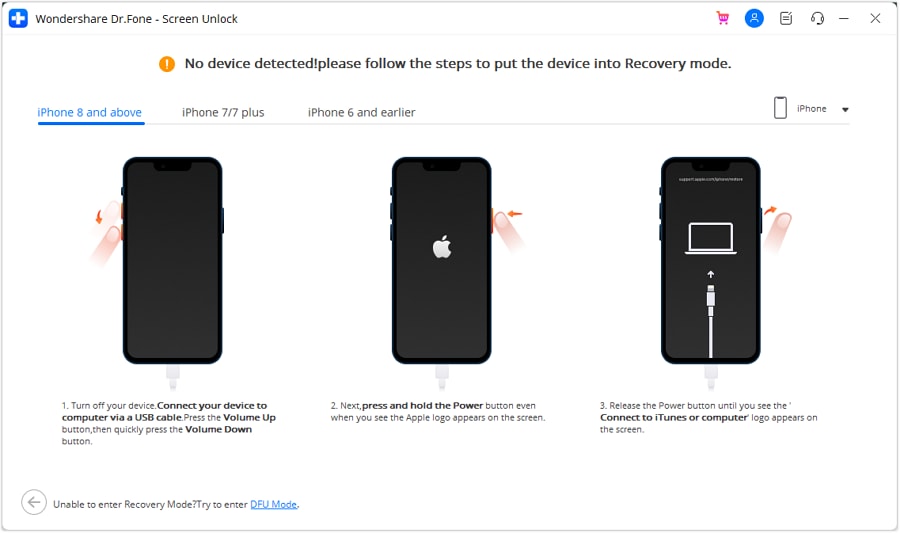
Step 3: Confirm Your iOS Device Information
After your device is in DFU mode, the software will display the Apple iPhone X device data, such as its Model and System Version. If the information displayed is not correct, you can put the correct information from the dropdown lists. Then click on “Download” to download the firmware for your device.
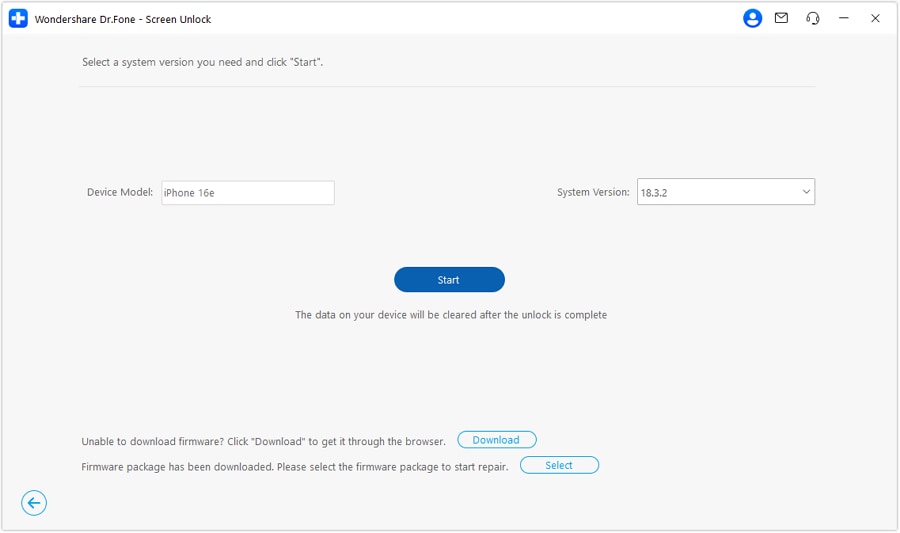
Step 4: Unlock Your Screen Lock
Once the firmware has been downloaded successfully, click “Unlock Now” to start the unlocking process. Your Apple iPhone X or iPad will be successfully unlocked in just a few seconds. Please note that this unlocking process will also erase the data on your device, as there is currently no solution to bypass the Apple iPhone X or iPad lock screen without data loss.
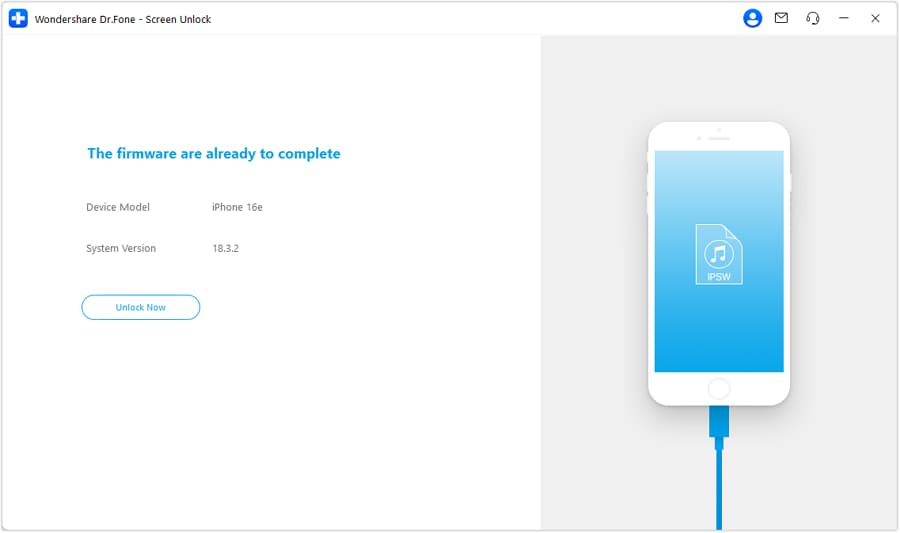
Video tutorial: Unlock disabled iPhone/iPad/iPod touch without iTunes/iCloud!

Pros
- Easy to use.
- Works for any iPhone.
- Unlocks iPhone quickly.
- 100% safe and secure.
Cons
- The program needs a subscription to unlock full functions.
Part 4: How to Unlock the Disabled iPhone Via Find My iCloud?
Most people believe that they can resolve the Apple iPhone X disabled issue only by taking the assistance of iTunes. While you can always restore your Apple iPhone X with iTunes , it is not the only available solution.
One of the most widely used methods to perform an iPhone disabled fix without iTunes is Apple’s Find My iPhone feature. It can be used to locate, lock, or reset your device remotely. If you have lost your Apple iPhone X, this would be an ideal solution to lock it or erase its content without any trouble.
You can learn how to unlock a disabled iPhone without iTunes by implementing these instructions.
- Step 1. Firstly, visit “Find My iPhone“ from a web browser and log in to your iCloud account by providing your Apple ID and password. Tap on the “Devices” option. It will display a list of all the Apple iPhone X devices that are linked to your Apple ID. Select the iOS device that has been disabled.

- Step 2. From here, you can locate the Apple iPhone X device, play a sound on it, lock it, or erase it. To fix a disabled iPhone or iPad without iTunes, you have to erase your device. Click on the “Erase iPhone” option and confirm your selection.

Wait for a while as the “Find My iPhone” feature will remotely erase your iOS device. Needless to say, it will also disable its lock.
Pros
- Easy to use
- Available on all devices with iCloud.
Cons
- Requires an active internet connection and access to another Apple device or computer.
Part 5: How to Use Find My App to Unlock the Disabled iPhone?
Find My App comes pre-installed on all iPhones running iOS 13 or later. This feature allows you to remotely locate, lock, or erase your device. You can also use the Find My application to unlock your Apple iPhone X if you have forgotten your passcode.
Here’s how to unlock your Apple iPhone X using Find My App:

- Step 1. Open the Find My App on your Apple iPhone X.
- Step 2. Tap “Devices” from the bottom menu.
- Step 3. Tap your Apple iPhone X from the list of devices.
- Step 4. Tap “Erase This Device” to erase all content and settings from your Apple iPhone X.
- Step 5. Once the Apple iPhone X device has been erased, you will be prompted to enter a new passcode.
- Step 6. Enter your new passcode and tap “Done” to unlock your Apple iPhone X.
Pros
- Convenient
- Available on all Apple devices.
Cons
- Requires an active internet connection and access to another Apple device.
- All data is lost.
Part 6: How to Try Finder to Unlock a Disabled iPhone on Mac?
If you have a Mac computer, you can use Finder to unlock your Disabled Apple iPhone X. Finder is the default file manager for Mac OS X.
Here’s how to unlock your Apple iPhone X via Finder:

- Step 1. Connect your Apple iPhone X to your Mac using a cable.
- Step 2. Open the Finder app.
- Step 3. Put your Disabled Apple iPhone X into recovery mode
- Step 4. Click “Restore” to proceed
- Step 5. Once the process is over, you will be prompted to enter a new passcode.
- Step 6. Enter your new passcode and click “Done” to unlock your Apple iPhone X.
Pros
- Easy to use and available on all Mac computers.
- Quick and easy.
Cons
- Requires a Lightning cable and access to a Mac computer.
Part 7: How to Unlock Disabled iPhone Without iTunes Using Siri?
You may be confused iPhone is disabled from connecting to iTunes, but how to unlock it without a computer? It might surprise you quite a bit, but you can also resolve the Apple iPhone X screen disabled issue with Siri. However, the solution can only work with devices running on iOS 8.0 to iOS 10.1.
Additionally, it was originally speculated as a loophole in iOS. Therefore, you might have to put a lot of effort into fixing the Apple iPhone X disabled problem using this technique. Though this won’t erase your device’s data , and you would be able to surpass the passcode initially.
To restore a disabled iPhone or iPad without iTunes, follow these stepwise instructions.
Step 1. To start with, hold the Home button on your device to activate Siri and ask for the present time by saying something like, “Hey Siri, what time is it?” or anything else that would display the clock. Tap on the Clock icon to commence the process.

Step 2. Visit the World Clock interface and choose to add another clock.

Step 3. The interface will ask you to choose a city. Type anything you want and tap on the “Select all” option.

Step 4. Afterward, you can find there various options like cut, copy, define, etc. Tap on the “Share” option.

Step 5. This will open another window, listing various options related to sharing. Tap on the Message icon to continue.

Step 6. Type anything in the “To” field and tap the return button on the keyboard.

Step 7. This will highlight the provided text in green color. Select it and tap on the plus icon.

Step 8. It will open a new window. From here, tap on the “Create New Contact” button.

Step 9. On the Add new contact screen, choose to add a photo and tap on the “Add Photo” option.

Step 10. This will open the Photo Library. From here, you can visit any album.

Step 11. Instead of selecting a picture, just exit the interface by pressing the Home button. This will open the iPhone’s home screen.

Tips: Since it is considered a loophole in iOS, it is not an efficient way to overcome the Apple iPhone X disabled issue in new iOS versions. If this solution fails, you are always advised to go to Solution 1 for a better fit.
Pros
- Quick and easy.
Cons
- Only available on iOS 8.0 to 10.1 and may not work on all devices.
- Requires an active internet connection, and the Apple iPhone X device must be plugged into a power source.
FAQs
1. How to Avoid a Disabled iPhone?
To avoid having your Apple iPhone X disabled, it is recommended to turn off your passcode, use Touch ID or Face ID, or make sure to remember your passcode. If you enter the wrong passcode repeatedly, your device will become disabled.
2. How to Unlock a Disabled iPhone without Data Loss?
The answer is no, all solutions now aren’t able to unlock your Apple iPhone X without losing data. So, back up your Apple iPhone X is the only way to restore your Apple iPhone X without data loss.
3. Why Unlock a Disabled iPhone without iTunes?
Unlocking a disabled iPhone without iTunes is becoming a popular choice because iTunes is not a user-friendly application and requires professional knowledge. Additionally, iTunes is known for being an unstable app, and many users prefer to use alternative methods that are more reliable and straightforward.
You might be interested in:
- iPhone Stuck on Connect to iTunes
- Can’t Update/Restore iPhone Due to Error Code 1100
- Can’t Restore iPhone Because of iTunes Error 11
Wrap it up
After following these solutions, you can use your Apple iPhone X and surpass its passcode without any trouble. Now that you know how to unlock a disabled iPhone without iTunes, you can simply use your device as per your requirements. Go ahead and pick your preferred option to perform iPhone disabled fix without iTunes. Download Dr.Fone - Screen Unlock (iOS) to resolve any unlocking issue related to your Apple iPhone X securely and reliably.
Resolve Your Apple iPhone X Keeps Asking for Outlook Password
Individuals and organizations use a diverse range of mail platforms to exchange information. Gmail, Outlook, or any alternative service is consistently utilized. While email platforms have revolutionized communication, they aren’t present without their challenges. Users often encounter issues that range from sync errors to authentication problems.
Among these challenges, iPhone users specifically grapple with a persistent issue. It often appears as “iPhone keeps asking for Outlook password.” This issue disrupts the user experience and raises security concerns. To address this problem, this guide presents a detailed guide featuring effective fixes.

Part 1. Why Does My iPhone Keep Asking for Outlook Password
The iPhone asking for Outlook password arises from a combination of factors. Understanding these reasons is crucial in diagnosing and resolving the problem effectively:
1. Incorrect Password Entry
Users might unknowingly enter the wrong password. They may have changed their Outlook password without updating it on their iPhones. This mismatch can trigger continuous password prompts.
2. Outdated Mail App
An outdated Outlook mail app on your Apple iPhone X may struggle to communicate with its latest security protocols. This can lead to performance issues like the Apple iPhone X keeps asking for passwords.
3. Network Connectivity Issues
Upholding a stable internet connection is necessary for effortless communication. An unreliable or unstable network can disrupt the synchronization process in Outlook.
4. Corrupted Email Account Profile
A corrupted email account profile on the Apple iPhone X can cause disruptions during the authentication process. Resetting the email account on the Apple iPhone X device might be necessary to resolve the issue.
5. Third-Party App Interference
Other mail applications installed on the Apple iPhone X can also cause an issue. They might interfere with the Outlook app’s proper functioning. Identifying and temporarily disabling such apps can help diagnose and resolve the issue.
6. Excessive Email Fetching
Configuring the Outlook mail app to fetch emails too frequently causes the issue. It can strain the connection with Outlook servers, leading to authentication challenges. That causes issues like the Apple iPhone X asking for a password.
7. iOS Software Glitches
The smooth functioning of the Mail app may be disrupted by problems and malfunctions present in the iOS software. Compatibility issues could emerge if your device is not operating on the latest iOS version.
Part 2. [Fixes] Solve iPhone/iPad Keeps Asking for Outlook Password
Now that we have explored why the iPad keeps asking for an Outlook password, it is time for practical solutions. These 13 fixes discussed below are designed to address the root causes comprehensively:
Fix 1. Add Password Once and Let the Prompt Disappear
If your Apple iPhone X continuously prompts you for the Outlook password, a simple solution is to re-enter the password. Follow these steps to potentially resolve the issue once and for all by accessing the respective settings:
- Step 1. You begin by accessing your iDevice’s “Settings” app and scrolling down to tap the “Mail” option. Next, press “Accounts,” and on the following screen, select the Outlook account.

- Step 2. Encountering the error message “Account not authenticated” is what you will come across. Now, tap the “Re-enter Password” option to enter your correct Outlook password.

Fix 2. Change the Password to Your Outlook Mail
Sometimes, the email service provider may force users to change their passwords for security reasons. There is a chance that it is why your iPhone asks for an Outlook password. To modify your Outlook password from the desktop platform, adhere to the following steps:
- Step 1. Open your preferred web browser and go to the Outlook login page. Sign in to your Outlook account, locate, and click on your profile picture in the upper-right corner. There, click “My Profile,” and on the next screen, tap “Change Password” near the upper right corner.

- Step 2. Upon reaching the verification page, provide your password and tap the “Sign In” button. Afterward, you will be asked for other verification methods. Upon verifying, the “Change your password” window will appear. Here, you will need to enter your “Current password,” “New password,” and re-enter it to proceed. Then, hit the “Save” button, and your password will be changed.

Fix 3. Checking the Network Connection
Network inconsistencies can often disrupt the authentication process. This can be the leading cause behind persistent password prompts. To ensure a stable connection, ensure that you are connected to a reliable and stable Wi-Fi network. You can also try toggling the Wi-Fi and mobile data switches on and off.
Another way to confirm if network errors are the problem is to try enabling Airplane Mode. After a while, disable the Airplane Mode and check if the issue is resolved.

Fix 4. Using the Mail Toggle as a Remedy
A strategic approach to resolving authentication issues involves using the Mail toggle. You can use it to disable and re-enable the email services. This action essentially resets the Outlook app’s connection and can be performed as follows:
- Step 1. Within your Apple iPhone X’s “Settings” app, scroll down and tap “Mail.” On the following screen, press “Accounts” and choose the “Outlook” account.

- Step 2. Here, you will find the toggle switch for “Mail.” Now, turn off the email service and wait for a few moments. Toggle the switch back on to re-enable the email service.

Fix 5. Delete and Re-Insert Outlook Account
Deleting and re-inserting your Outlook account on your Apple iPhone X can provide a fresh start to the email integration. Follow these steps if the persistent iPhone keeps asking for an Outlook password:
- Step 1. Navigate to the “Mail” tab within the “Settings” app on your Apple iPhone X, and choose “Accounts” to observe the roster of email accounts. Here, tap on your Outlook account, and the following screen, press “Delete Account.”

- Step 2. Once you have deleted the account, return to the “Accounts” tab. Select “Outlook.com” after tapping on “Add Account.” Now, follow the on-screen instructions to re-enter your account details.

Fix 6. Re-Check Sync Settings
Ensuring that your sync settings align with Outlook’s recommended configurations is crucial. Follow these steps to re-check and adjust your sync settings on your Apple iPhone X:
- Step 1. After accessing the “Mail” tab within the Settings app, tap “Accounts.” Here, find and choose the “Fetch New Data” option, followed by selecting the “Outlook” account.

- Step 2. Confirm that the “Push” or “Fetch” settings are configured to your preference. “Push” enables real-time updates, while “Fetch” allows you to set specific intervals for email updates.

Fix 7. Uninstall and Re-Install Outlook App
Is the Outlook app generally showing a lot of glitches on your Apple iPhone X? If yes, uninstalling and then re-installing it can address potential “iPhone**/iPad keeps asking for Outlook password”** issues:
Instructions: On your Apple iPhone X’s home screen, navigate to the Outlook mail app. Long-press the Outlook app icon and choose “Remove App” from the pop-up menu. Then, tap “Delete App” and follow it by pressing “Delete” to uninstall the app. Afterward, access the App Store and download the Microsoft Outlook app again.

Fix 8. Update iOS From Settings
Outdated iOS versions can contribute to compatibility issues and glitches. This can affect the proper functioning of the Mail app and its integration with Outlook. Follow these steps to ensure your iOS is up to date:
Instructions. Access your device’s “General” settings from the Settings app. Tap “Software Update” on the next screen and check if an update is available. Tap “Install Now” to kick-start the iOS updating process if an update is available. Make sure your device is adequately charged and maintains a stable internet connection.
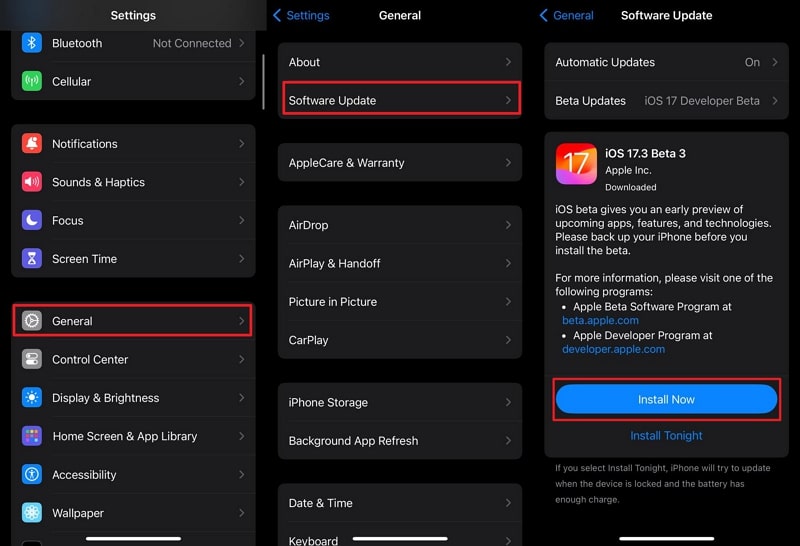
Fix 9. Try Other Alternatives to Outlook
Exploring alternative mail applications may offer a viable workaround. This is especially true if the iPhone asking for the Outlook password proves resistant to previous solutions. Consider using other email platforms such as Apple Mail, Gmail, and Yahoo Mail. This solution might not directly resolve the issue with Outlook. Yet, an alternative can provide a temporary workaround until a solution is found.
=

Fix 10. Try Disabling Privacy Protection
Certain privacy protection features on your Apple iPhone X may interfere with the integration of Outlook. To troubleshoot this, consider temporarily disabling privacy protection settings:
Instructions. On your Apple iPhone X, access “Mail” settings through the Settings application. Now, scroll down to find and tap the “Privacy Protection” option in the “Messages” section. Next, you will come across the “Protect Mail Activity” switch. Here, toggle off the switch to check if it is resolved.

Fix 11. Reset All Settings of the iPhone
If the persistent password prompts remain unresolved, resetting all settings on your Apple iPhone X can be the solution. It acts as a comprehensive solution to potential configuration issues. This action does not erase your data but resets system settings to default. To reset all settings on your Apple iPhone X, you can follow these steps:
- Step 1. Navigate to the “General” tab in the “Settings” app on your Apple iPhone X after you open it. Move down the screen, and at the bottom, choose “Transfer or Reset iPhone.”

- Step 2. On the following screen, tap “Reset” and select “Reset All Settings” from the available options. Enter your device passcode if prompted and confirm the action by selecting “Reset All Settings” again.

Fix 12. Add an Account by Switching to IMAP
In some cases, switching the account type to IMAP during the setup process can help resolve issues. For many users, it has worked to resolve issues related to Outlook password prompts. Follow these steps to add your Outlook account using the IMAP protocol:
- Step 1. Begin by accessing the “Settings” app on your Apple iPhone X, then scroll down to locate and tap on “Mail.” Within this section, choose “Accounts” to display the roster of email accounts, and proceed to tap on “Add Account.”

- Step 2. Choose “Other” as the account type and select “Add Mail Account.” Enter your Name, full Outlook email address, descriptive description, and unique password, and hit “Next.”

- Step 3. Utilize the specified settings for the “Incoming Mail Server” and “Outgoing Mail Server” sections under the “IMAP” tab:
Incoming Mail Server
Hostname: imap-mail.outlook.com
Username: Your full Outlook email address
Password: Your Outlook password
Outgoing Mail Server
Hostname: smtp-mail.outlook.com
Username: Your full Outlook email address
Password: Your Outlook password
At last, hit the “Next” button at the top-right side of the screen.

Fix 13. Contact Support of Outlook To Resolve
If none of the previous fixes resolve the issue, seek help directly from Outlook Support. Outlook’s support is capable of addressing a broad spectrum of issues. It is adept at delivering personalized assistance tailored to your circumstances.
Bonus Part. Can’t Access Outlook Because iPhone Is Locked? A Quick Solution
The iPhone keeps asking for an Outlook password, which isn’t the only password-related problem. Forgetting the screen locks of their iPhones is a common phenomenon. It is especially prevalent among iPhone users. You can no longer access important Outlook emails when your Apple iPhone X is locked. That is where Wondershare Dr.Fone emerges as your savior. This powerful tool can bypass all types of iOS screen locks within minutes.
It can remove lock screens on your Apple iPhone X, iPad, and iPod. You can say goodbye to the hassle of dealing with iCloud activation locks. Moreover, it helps remove your Apple ID if you have forgotten your Apple ID password. Dr.Fone allows you to bypass them effortlessly without requiring a password.
Prime Features of Wondershare Dr.Fone
- It can circumvent Mobile Device Management and screen time restrictions without data loss.
- This tool completely supports the most recent iOS 17, iPadOS 17, and iPhone 15.
- Additionally, this software effortlessly bypasses carrier locks on your Apple iPhone X.
Steps To Unlock Your Apple iPhone X via Wondershare Dr.Fone
Unlocking your Apple iPhone X using Wondershare Dr.Fone is a straightforward process. That is made possible with its intuitive interface and a simple 3-step procedure. You can use the following steps to bypass your Apple iPhone X’s screen lock within minutes:
- Step 1: Access Screen Unlock by Launching Dr.Fone
Once you’ve launched Dr.Fone on your computer, go to Toolbox. Here, tap “Screen Unlock” and choose “iOS.” In the opened window, choose the “Unlock iOS Screen” option to unlock your iOS device’s screen. On the subsequent screen, click “Start” to commence the iOS device unlocking process.
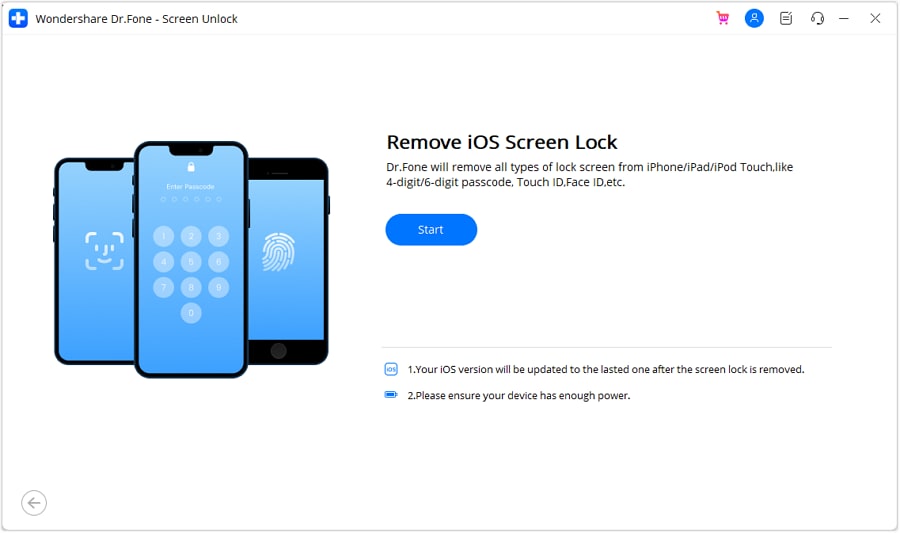
- Step 2: Initiating iPhone Recovery Mode and Device Identification
Subsequently, you need to place your Apple iPhone X into Recovery Mode. Adhere to the on-screen instructions corresponding to the model of your iDevice. Afterward, the tool will automatically detect the “Device Model.” If necessary, adjust the model and choose the “System Version.” Once these steps are completed, click “Start” to initiate the unlocking process.

- Step 3: Finalizing iOS Device Unlock
Monitor the iOS firmware download progress on the screen. After successful download and verification, proceed by selecting “Unlock Now.” A confirmation window will appear, prompting you to input the necessary code. Enter the code and tap Unlock to proceed to the outcome. Upon unlocking the iDevice, click the “Done” button to finalize the process.
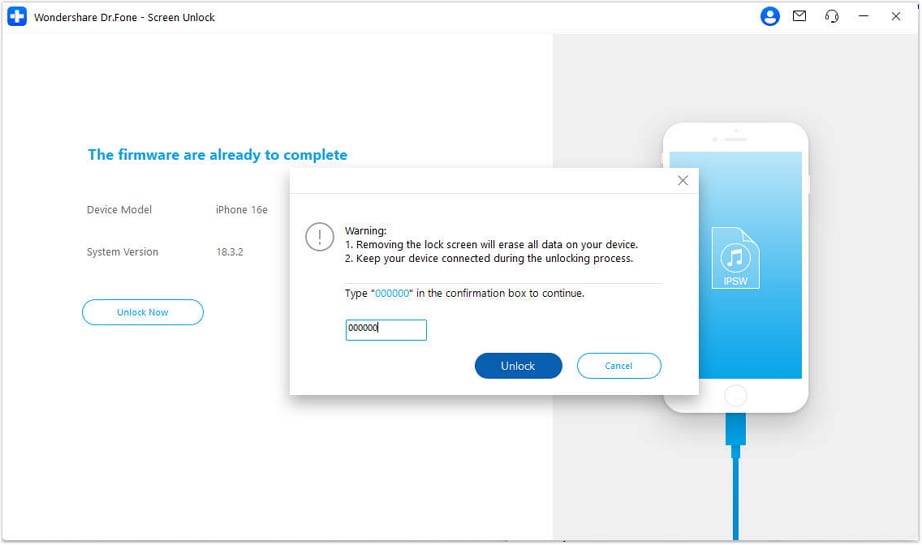
Conclusion
To summarize, resolving an iPhone asking for an Outlook password requires a systematic approach. From re-entering passwords to adjusting settings, this guide has covered 13 comprehensive fixes. For those facing the challenge of a locked iPhone, Dr.Fone offers a reliable solution. Users can ensure integration between their iPhones and Outlook by addressing these issues. This will enhance their overall email experience.
Tips: Are you searching for a powerful Screen Unlock tool? No worries as Dr.Fone is here to help you. Download it and start a seamless unlock experience!
Did Your Apple iPhone X Passcode Change Itself? Unlock It Now
The Apple iPhone X changing passcodes itself is not a commonly reported issue, but it surely can happen to anyone. While the reasons are uncertain, the issue can be resolved without putting much strain on your device. If you face this iPhone passcode changed itself issue by any chance, it makes it hard for you to get into your Apple iPhone X.
However, you don’t need to worry, as this well-organized guide provides authentic methods to solve this issue. You will also find a bonus tool to fix your iPhone/iPad passcode changed itself issue without any need of knowledge.

Part 1. What Are the Reasons for iPhone Passcode Changing by Itself
Before solving the Apple iPhone X or iPad passcode changed itself issue, you should know the actual reason behind it. Here are some points that precisely explain why the Apple iPhone X changed its passcode by itself:
- Frequent iOS Updates: One major issue that can cause the problem of iPhone passcodes changing by itself is the ongoing iOS updates. An update can sometimes cause major glitches in the Apple iPhone X device, which might automatically change the credentials.
- iOS System Error: Many users are reportedly known for installing and using the Beta version of iOS on their iPhones/iPads. These versions are known to hold major glitches and bugs in the software. Usually, the Apple iPhone X changing passcode issue is normally reported by users under such scenarios.
- Malware: Malicious apps can damage your system security and make your iOS device change the passcode automatically. This can either happen due to device hacking or system security breaches.
Part 2. [The Simplest Solution] Remove iPhone Passcodes With Wondershare Dr.Fone
There are multiple ways to resolve the “iPhone changed passcode itself” issue, but they can be consistently difficult. Here, Wondershare Dr.Fone provides the simplest solution to fix your Apple iPhone X without putting any effort. When fixing your Apple iPhone X’s screen locks, Wondershare Dr.Fone caters to different scenarios. From Touch ID to Face ID and other basic screen locks, this tool unlocks it within minutes.
It clearly shows that you can easily get yourselves out of the miserable iPhone changed passcode itself issue. This is not only what Wondershare Dr.Fone offers its users. You can also find a high success rate for unlocking carrier and MDM locks.
Key Features of Wondershare Dr.Fone
- Wondershare Dr.Fone is compatible with all iOS devices up to iOS 17, which allows everyone to get help using its advanced functionality.
- If you lose access to your Apple ID, it can bypass the iCloud Activation Lock and help you set up your iOS device like a new one.
- Without damaging the data, Wondershare Dr.Fone allows you to remove the iTunes backup encryption . This allows you to back up, restore, transfer, or easily wipe out your device’s data.
Comprehensive Guide To Unlock Screen Using Wondershare Dr.Fone
Wondershare Dr.Fone provides the simplest solution to unlock your Apple iPhone X and remove the passcode change issue. Follow this step-by-step guide to complete the screen unlocking process without wasting any time:
- Step 1. Start Tool and Choose Screen Unlock Function
Initially, launch Wondershare Dr.Fone on your computer and connect it to your concerned iPhone. Go into the “Toolbox” and choose the “Screen Unlock” function from the given options. Next, select “iOS” to run the process for the iOS device. Choose the “Unlock iOS Screen” option and hit the “Start” button to initiate the unlocking process.

- Step 2. Put Your Apple iPhone X in Recovery Mode and Confirm Status
After that, follow the on-screen instructions to put your Apple iPhone X in the Recovery Mode. In the next window, you can see your device model recognized. Then, enter your “System Version” and hit the “Start” button again to continue.

- Step 3. Download iOS Firmware and Confirm
Then, the system starts downloading the required iOS firmware according to your Apple iPhone X model. Once the download is complete, click “Unlock Now” to implement the screen unlocking process. Enter the code in the confirmation box in the next window and choose the “Unlock” option.

- Step 4. Install iOS Firmware To Unlock Completely
After that, you can see a progress bar of the unlocking screen process. Then, it takes you to the next window after completion, where you click the “Done” button to accomplish the process.
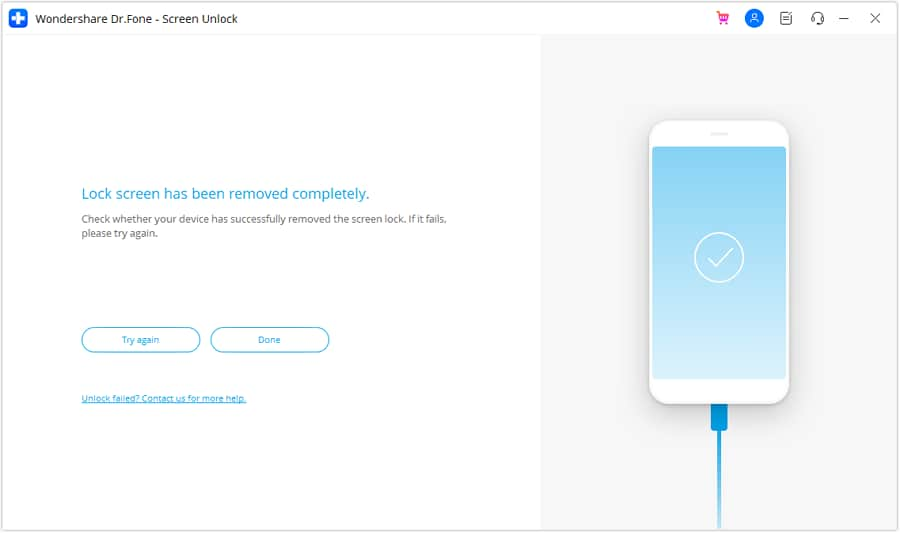
Part 3. Set Up the Apple iPhone X device Again Using the Security Lockout Procedure
Security Lockout or “iPhone Unavailable” happens when you attempt a wrong passcode 10 times. From there, you need to erase all your Apple iPhone X data to regain access to the iOS device again.
While there is no direct way to regain access to your device when its passcode changes, you will have to perform a factory reset on your Apple iPhone X to make it reusable. For that, look through the comprehensive guide on how to take your device out of this state:
- Step 1. After getting your iOS 17 device into the “iPhone Unavailable” stage, tap the “Forgot Passcode?” option in the bottom right corner.
- Step 2. To start the Apple iPhone X reset, you need to tap on the “Start iPhone Reset.” Then, enter your Apple ID password in the given box and sign out your Apple ID. If you have an eSIM, you will be prompted with an option. Select the “Keep eSIM and Erase Data” or the “Delete eSIM and Erase Data” option according to your choice.

In another case, Apple allows you to temporarily sign in to your Apple iPhone X using a recently changed passcode within 72 hours. But once you get into your device, set a new passcode immediately to retain your full access.
Part 4. Using iTunes To Set Up iOS Device Again
iTunes service allows you to reset your Apple iPhone X to factory settings and unlock the screen lock if the Apple iPhone X passcode changes on its own. Using iTunes to set up your Apple iPhone X again is a good and safe method, but it removes your device data. If you can compromise losing data, you can follow these instructions to remove the Apple iPhone X Passcode Changed Itself issue using iTunes:
Instructions. Firstly, launch iTunes on your desktop and connect your Apple iPhone X. Then, you need to progress into putting your Apple iPhone X in the Recovery Mode . Continuing this, iTunes detects your device in Recovery Mode and shows two options: “Update” or “Restore.” Click on the “Restore” option and hit the “OK” button to restore your Apple iPhone X and regain access.

Part 5. Using iCloud To Set Up iOS Device Again
Using iCloud to unlock iOS devices is a safe and recommended method, but it also leads to complete data loss. If you wish to consider using the iCloud method, it is important for the Find My service to be active on the Apple iPhone X device. Also, you need to be aware of your Apple ID and password before proceeding. Follow this comprehensive guide step-by-step to set up your iOS device again using iCloud.
- Step 1. First of all, open iCloud on your desktop web browser. Afterward, enter your “Apple ID” and “Password” to proceed. After trusting the Apple iPhone X device, look for the “Grid” icon on the top right to find the “Find My” option in the list.

- Step 2. After that, choose the Apple iPhone X device that you want to recover. Then, click the “Erase This Device” option to remove data and regain your device access.

Part 6. Using Find My App To Set Up iOS Device Again
This method needs you to have another iOS device signed into the same Apple ID with the Find My option enabled. After fulfilling these preconditions, you can follow these steps to set up your device whose iPhone passcode changed from 4 to 6 digits by itself:
- Step 1. Launch the Find My App on any other device, select the “Devices” tab from the bottom menu, find your locked iPhone in the list, and tap on that.
- Step 2. You must select the “Erase This Device” button to remove it from the iCloud account. This will instantly factory reset the Apple iPhone X device as if it is a new iOS device.

Bonus Tip. How To Change Passcode on iPhone: A Simple Guide
We’ve discussed various reasons why the iPhone passcode changed itself above. However, there are several instances where you want to change the passcode yourself. What to do if you are looking for an effective way to change your Apple iPhone X’s passcode? Follow the simple step-by-step guide to change the passcode from the iDevice’s “Settings:”
- Step 1. First, open iPhone “Settings” and go to the “Face ID & Passcode” option to access the Apple iPhone X device’s security settings.

- Step 2. After that, tap “Change Passcode” and enter your six-digit passcode to see passcode options. Open “Passcode Options” and set a four-digit passcode easily or vice versa.

Conclusion
In this article, we’ve gone through the scenario of iPhone/iPad passcode changing itself due to system glitches. To fix this problem, we have introduced some effective and reliable methods with simple steps. However, Wondershare Dr.Fone is the recommended tool to bypass this issue because it provides a high success rate with an easy-to-follow system.
Tips: Are you searching for a powerful Screen Unlock tool? No worries as Dr.Fone is here to help you. Download it and start a seamless unlock experience!
Also read:
- [New] From Raw to Refined The Essential Guide to Podcast Editing with GarageBand
- [Updated] 2024 Approved Capture Your Best Side Tips for Effective Talking-Head Shots
- [Updated] 2024 Approved Superior Screen Recorder Review
- [Updated] Swiftly Move Data Fast and Reliable Methods to Direct Files Onto Your Computer
- 11 Best Location Changers for Tecno Spark 10C | Dr.fone
- 2024 Approved Shifting From Spotify Playlists to Customized YouTube Music Catalogs
- How To Change Your Apple ID Password On your iPhone 11
- How to Turn Off Find My iPhone 11 Pro when Phone is Broken?
- How to Unlock iPhone 13 Passcode without Computer?
- In 2024, Detailed Review of doctorSIM Unlock Service For iPhone 6 Plus
- In 2024, Full Guide to Unlock Your Samsung Galaxy M14 5G
- In 2024, How to Transfer Contacts from Infinix Note 30 VIP To Phone | Dr.fone
- In 2024, Is Your iPhone 12 in Security Lockout? Proper Ways To Unlock
- In 2024, PassFab iPhone 15 Backup Unlocker Top 4 Alternatives
- Reset iTunes Backup Password Of iPhone 15 Plus Prevention & Solution
- Step-by-Step Guide: Restoring Your Data Post-Clean Install on Windows 10 & 11
- Title: In 2024, Unlock Your Disabled iPhone X Without iTunes in 5 Ways
- Author: Sophia
- Created at : 2025-02-09 23:23:08
- Updated at : 2025-02-14 18:15:51
- Link: https://ios-unlock.techidaily.com/in-2024-unlock-your-disabled-iphone-x-without-itunes-in-5-ways-by-drfone-ios/
- License: This work is licensed under CC BY-NC-SA 4.0.
